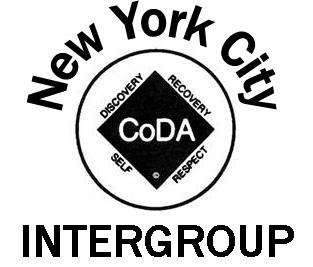 |
A Twelve Step self-help program for Co-Dependents |
| Click on a Step below to see the readings and exercises for that Step. Step 1 Step 2 Step 3 Step 4 Step 5 Step 6 Step 7 Step 8 Step 9 Step 10 Step 11 Step 12 |
CoDependents Anonymous (CoDA) in New York City This web site has been provided by NYC CoDA Intergroup Working the 12 Steps of CoDependents Anonymous (CoDA) © 2005 NYC CoDA Intergroup. All rights reserved. The CoDA 12 Steps and 12 Promises are © Co-Dependents Anonymous, Inc. The Twelve Steps and Twelve Traditions have been reprinted and adapted with permission of Alcoholics Anonymous World Services, Inc. Permission to reprint and adapt this material does not mean that AA has reviewed or approved the content of this publication, nor that AA agrees with the views expressed herein. AA is a program of recovery from alcoholism only – use of the Twelve Steps and Twelve Traditions in connection with programs and activities which are patterned after AA, but which address other problems, does not imply otherwise. Step 5 Co-Dependents Anonymous Step 5: “Admitted to God, to ourselves, and to another human being the exact nature of our wrongs.” Co-Dependents Anonymous Promise 5: “I know a new love and acceptance of myself and others. I feel genuinely lovable, loving and loved.” Suggested Reading CoDA Blue Book pp. 47-50. 12 Step Handbook: Step 5 Chapter, pages 23-26. The 5th Step prayer is on page 26. “CoDA 12 Steps & 12 Traditions Workbook – Steps 4,5,6” : Step 5 is pages 21-23. Exercises These exercises can help you work the 5th Step. In other words, they allow you to get into the feelings and specifics and not just rush through the Step. Keep the task manageable; set safe boundaries for yourself. For example, set aside an amount of time that feels comfortable to you to work the Step on a given night. Keep it simple. Consider “book-ending” with your Step work. Book-ending means telling someone, or your meeting, that you plan to do something, then telling them afterwards that you did it. It can help you show up for yourself. Finally, be gentle, and remember that reading and writing about a Step are an important part of working the Steps. 1. Without editing or over-analyzing, write about “what the 5th Step means to me.” 2. Review the questions on pages 21-23 of the “CoDA 12 Steps & 12 Traditions Workbook – Steps 4,5,6” . Use any that feel right. Also review the gifts of completing, and notes on receiving, a 5th Step. 3. Why is the 5th Step necessary? How is this Step different from the 4th Step (taking my inventory)? 4. How is the 5th Step related to the 5th Promise? (see above) 5. What does it feel like to admit that I have “wrongs”? What is my understanding of the term “wrongs”? Is it important for me to be right, in the short and the long run? 6. Exercise – find your own way to admit your wrongs to God, as you understand God. Perhaps a special ritual in a special place. What feels right? What feels safe? Take some time to decide how you want to handle this part of the Step. Then set aside time and do it in a way that feels right to you. 7. Exercise – how do you want to admit your wrongs to yourself? Is there a time and a place you can do that? How is admitting your wrongs to yourself different from the work you did in the 4th Step? After considering these questions, set aside time to admit your wrongs to yourself, in a way that feels right to you. 8. Am I afraid to admit my wrongs to another? What feelings come up? Why can’t I just do this alone and not bring anyone else in on my process? Are there secrets that I don’t want anyone to know? What will happen if someone else finds out? What would be the result if I never told anyone? 9. Who do I trust to hear my 5th Step? Do I want to ask a CoDA friend, therapist, or counselor? What boundaries do I want to set up? (How much time, do I want to ask for silence or comments, etc.) 10. Exercise – try out a few possible people to share your 5th Step with. Maybe talk after a meeting, or on the phone. See how it feels to share something about yourself with each person. Then sleep on it. Turn it over. Does one of these people feel safe to hear your 5th Step? 11. Communication Exercise (especially for receiving a 5th Step and/or a “co-sponsor” relationship) – practice the healthy communication technique outlined on the Steps homepage ( www.codanyc.org/steps ). Practice mirroring, empathizing, and validating. Consider sharing with a CoDA friend, where one person shares and the other listens, perhaps with a time limit for each. Then switch roles. If you’d like, consider using this technique to process your 5th Step with a “co-sponsor,” i.e. each person gives and then receives a 5th Step. 12. Is trust difficult for me? What fears come up around “admitting my wrongs” to another? How can I help myself feel safe in working this Step, especially admitting my wrongs to another? If you want to be on our email list to receive updates on upcoming CoDA events in New York City, please write to anicko2794@yahoo.com For more CoDA info, go to www.codependentsnyc.org or call 646-289-9954 For more information on the program of CoDependents Anonymous, visit the CoDA World Fellowship web site at www.coda.org |